Asynchronous Web Server – ESP32-S3 – Ethernet – Wifi
Here after an implementation of an asynchronous web server on a board powered by the ESP32S3 processor. This server is designed to communicate not only over Wi-Fi—as is typical—but also via Ethernet through the RJ45 connector.
Board T-ETH-LITE ESP32-S3 in configuration N16R8 available at Aliexpress
Processor and Memory
The board is built around a dual-core ESP32S3 processor. It includes 512 KB of internal RAM and a generous 16 MB of flash memory for storing programs and data—four times the capacity of a standard ESP32. Additionally, it features 8 MB of external PSRAM, which is ideal for handling large datasets or complex data arrays.
| Characteristic | Typical Figure |
|---|---|
| Processeur | 2 × Xtensa LX7 @ 240 MHz |
| RAM interne (SRAM) | 512 Ko |
| Flash externe (SPI) | 16 Mo |
| PSRAM | 8 Mo |
| Wi-Fi | 802.11 b/g/n (2,4 GHz) |
| Bluetooth | LE 5.0 (BLE + Bluetooth Mesh) |
| Ethernet | 100Mb Full Duplex (W5500) |
| Ports | SPI, I²C, I²S, UART, PWM, ADC, DAC, USB, etc. |
| AI/ML Acceleration | Support pour instructions vectorielles SIMD et moteur AI |
| Stockage externe | Slot pour carte MicroSD (TF card) pour stockage local de données |
Communication Capabilities
The ESP32S3 supports Wi-Fi, Bluetooth, and Ethernet communication, offering flexibility for various applications. It also provides a wide range of free GPIOs for analog/digital inputs and outputs, as well as serial communication. A notable feature is its ability to process data in parallel using SIMD (Single Instruction, Multiple Data), and it supports microSD card storage for additional data handling.
Pinout and Power Features
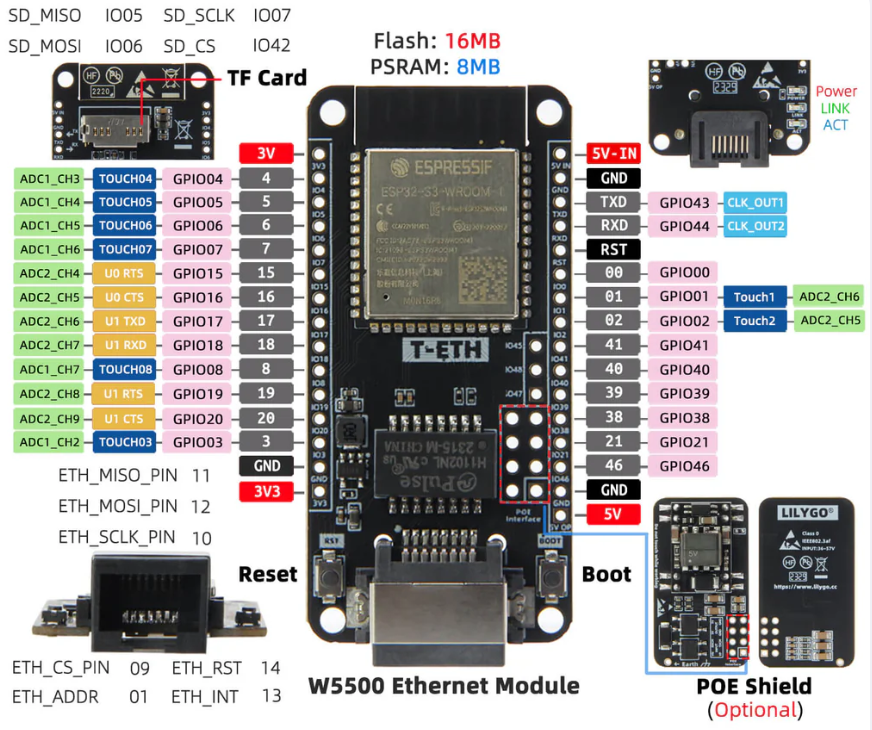
The board’s pinout reveals a wealth of accessible GPIOs. One standout feature is Power over Ethernet (PoE), allowing the board to be powered directly through the Ethernet cable.
Programming the ESP32S3
This board lacks a built-in USB connector, so programming requires an FTDI 232 board. This board connects to your PC on one end and communicates with the ESP32S3 via serial on the other. Important: Always set the FTDI 232 jumper to 3.3V to avoid damaging the ESP32S3 with 5V.
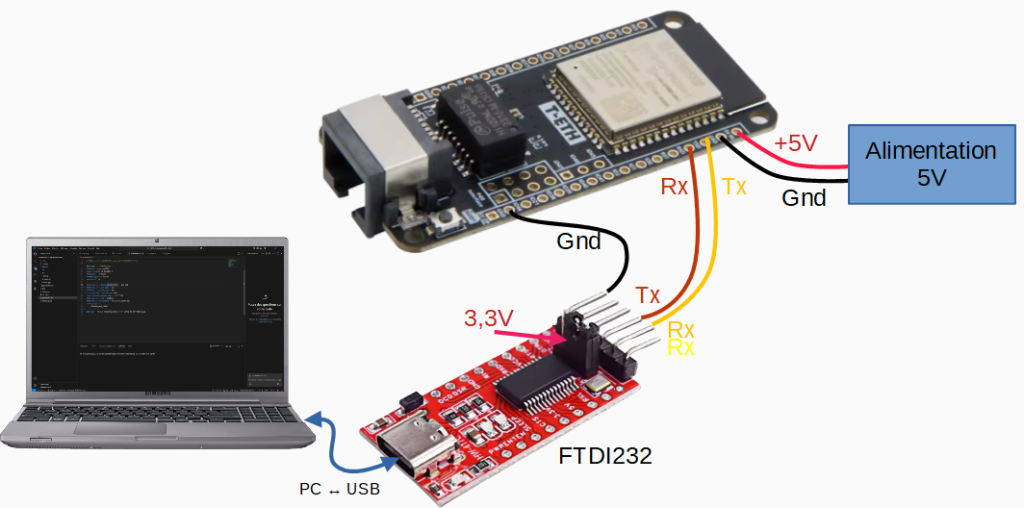
To power the system, an external 5V power supply is needed.
After compiling a program, to start the transfer from the PC to the ESP32 card, you must:
- press boot
- briefly press reset
- release boot
Asynchronous Web Server Application
I’ve developed an asynchronous web server for this board, capable of communicating over Ethernet and/or Wi-Fi. The code is available on PlatformIO IDE but can also be adapted for the Arduino IDE.
The difficulty around this card was to find a library that provides an asynchronous web server compatible with the W5500 module and allowing the Wifi and/or Ethernet connection. The choice fell on: AsyncWebServer_ESP32_SC_W5500.h available on PlatformIO and Arduino IDE. The definition of the interface GPIOs with the W5500 is adapted to the launch of the program to the physical layout of the T-ETH-LITE ESP32-S3 card.
The 16 MB flash memory is partitioned into:
- Two 6.5 MB application areas
- A small area for Over-The-Air (OTA) updates
- A dedicated area for storing files in SPIFFS format
| # Name | Type | SubType | Offset | Size | Flags |
| nvs | data | nvs | 0x9000 | 0x5000 | |
| otadata | data | ota | 0xe000 | 0x2000 | |
| app0 | app | ota_0 | 0x10000 | 0x660000 | |
| app1 | app | ota_1 | 0x670000 | 0x660000 | |
| spiffs | data | spiffs | 0xCD0000 | 0x200000 | |
| corredump | data | coredump | 64K |
Resources and Support
For more information, visit:
- My website: f1atb.fr
- My YouTube channel for tutorial videos
- The GitHub repository (F1ATB) for the source code : ESP32-S3-AsyncWeb-ETH-WIFI
- The F1ATB forum for questions and community support
- Board T-ETH-LITE ESP32-S3 in configuration N16R8 available at Aliexpress
⚠️Special Features
Ethernet (W5500) and the SD card cannot be used simultaneously if both require the same SPI bus, unless the SPIs are reassigned (use SPI2 for one, etc.).
The WiFi antenna is PCB-based (integrated).
Ethernet control is via SPI, which adds latency compared to an internal MAC/PHY interface. This remains very usable depending on the project.
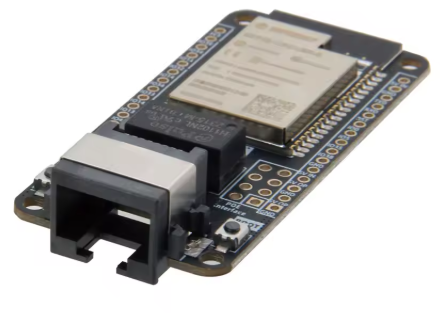
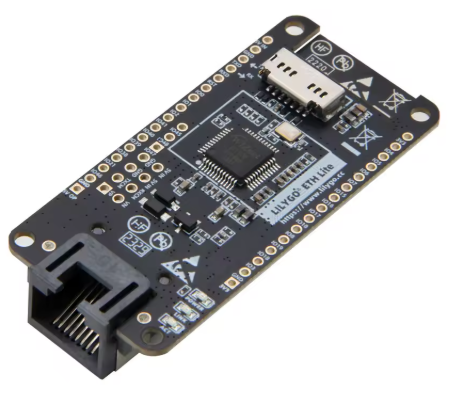
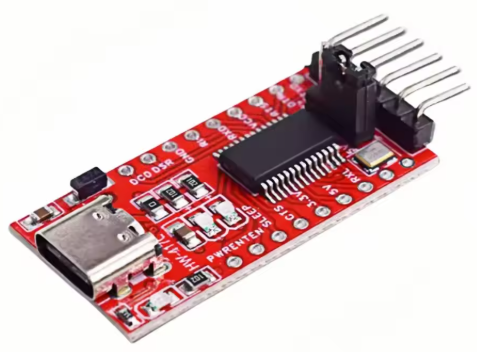
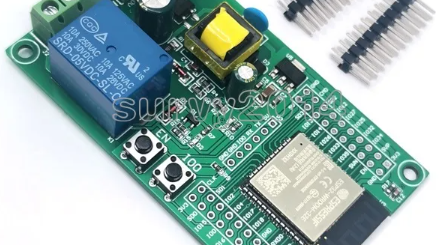
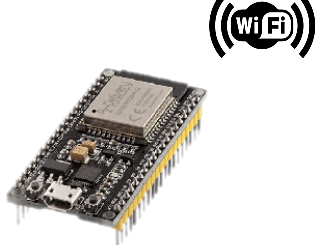
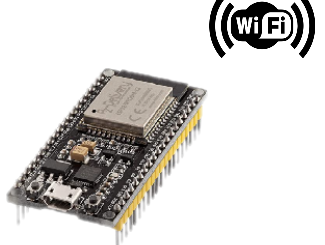


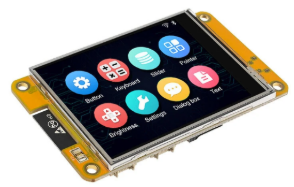
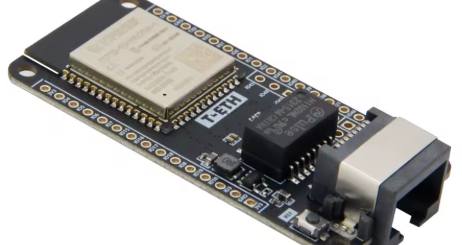
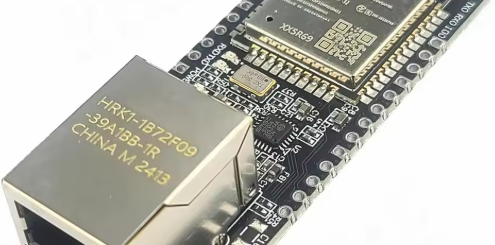
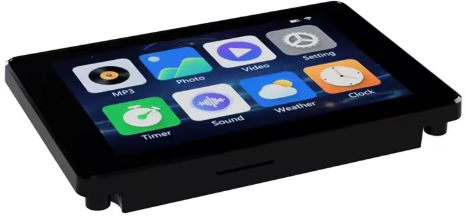

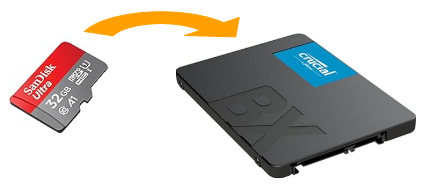
Recent Comments